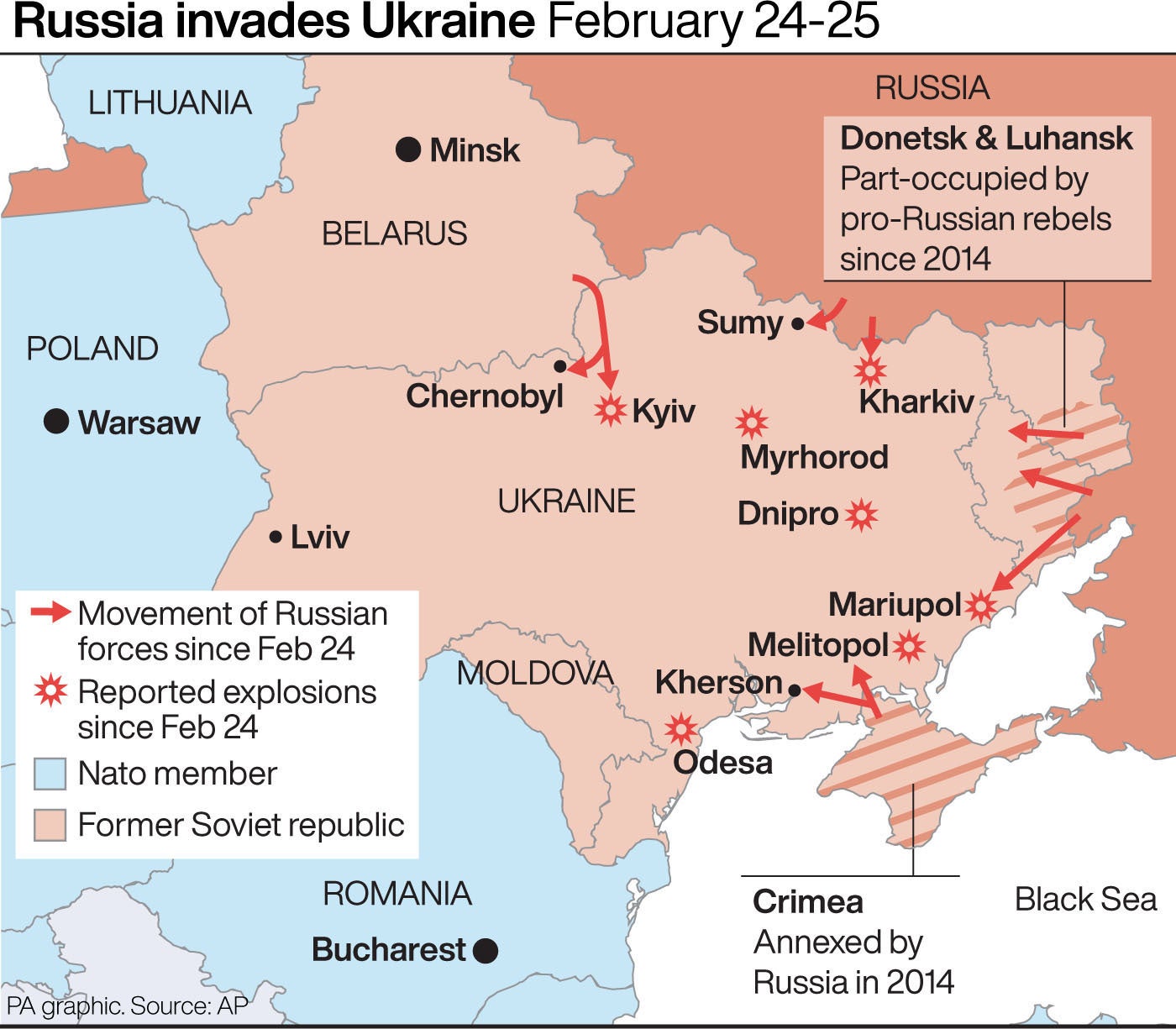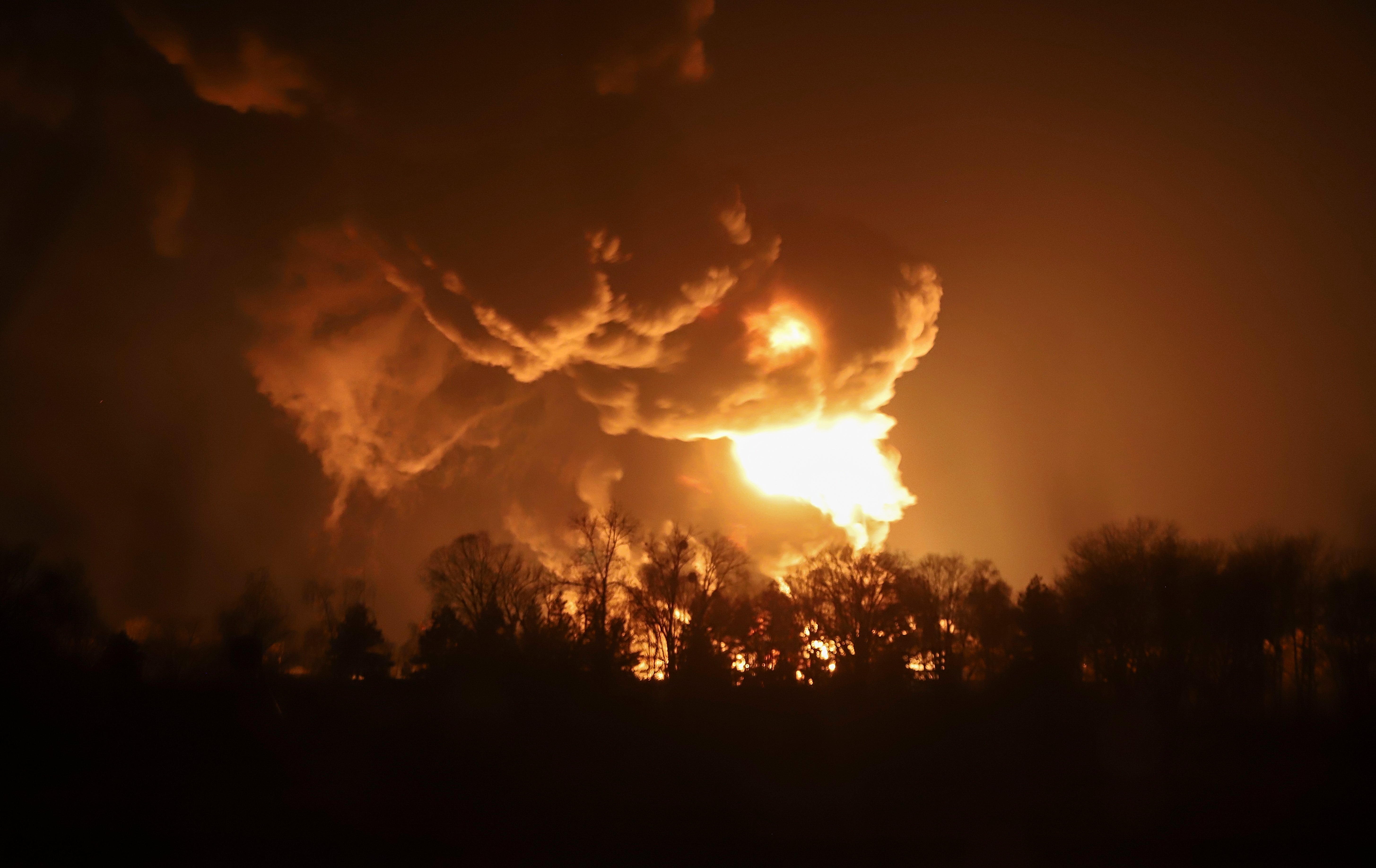Belarus president blames western sanctions ‘for pushing Russia into Third World War’
Ukraine and Russia will hold peace talks on Belarusian border on Monday
Your support helps us to tell the story
From reproductive rights to climate change to Big Tech, The Independent is on the ground when the story is developing. Whether it's investigating the financials of Elon Musk's pro-Trump PAC or producing our latest documentary, 'The A Word', which shines a light on the American women fighting for reproductive rights, we know how important it is to parse out the facts from the messaging.
At such a critical moment in US history, we need reporters on the ground. Your donation allows us to keep sending journalists to speak to both sides of the story.
The Independent is trusted by Americans across the entire political spectrum. And unlike many other quality news outlets, we choose not to lock Americans out of our reporting and analysis with paywalls. We believe quality journalism should be available to everyone, paid for by those who can afford it.
Your support makes all the difference.Belarusian president Alexander Lukashenko has warned that the West is “pushing Russia into World War Three” by imposing sanctions on the country.
Mr Lukashenko, a close ally of Vladimir Putin, formally renounced Belarus’s non-nuclear and neutral status, allowing Russia to place nuclear weapons on its territory, following a referendum on Sunday.
“Now there is a lot of talk against the banking sector, gas, oil, Swift. It’s worse than war,” Mr Lukashenko said. “This is pushing Russia into a Third World War. We need to be restrained here so as not to get into trouble. Because nuclear war is the end of everything”.
Belarus’s central elections commission said 65.2 per cent of those who took part in the referendum voted in favor, though the result came as little surprise given the tightly controlled rule of President Lukashenko. Hundreds of people were arrested after the referendum sparked anti-war protests in several cities, rights activists said.
Mr Lukashenko’s comments come before Belarus hosts the first peace talks between Ukrainian and Russian delegations at its border today, five days after Vladimir Putin ordered the start of the invasion.
Ukraine said its delegation had arrived at the border on Monday morning for talks, after Russian president Vladimir Putin put his nuclear forces on high alert citing “aggressive statements” by Nato and tough financial sanctions.

The Russian leader is “potentially putting in play forces that, if there’s a miscalculation, could make things much, much more dangerous,” said a senior US defense official, speaking on condition of anonymity to discuss rapidly unfolding military operations.
Mr Putin’s directive came as Russian forces encountered strong opposition from Ukraine defenders. Moscow has so far failed to win full control of Ukraine’s airspace, despite advances across the country.
US officials say they believe the invasion has been more difficult, and slower, than the Kremlin envisioned, though that could change as Moscow adapts.
The conflict could change significantly if Russia gets military help from neighboring Belarus, which is expected to send troops into Ukraine as soon as Monday, according to a senior American intelligence official with direct knowledge of current US intelligence assessments.

Moscow faces unprecedented rounds of international sanctions, hitting Mr Putin himself and his foreign minister Sergei Lavrov, and hitting every sector of the economy.
These continued on Sunday when one of Britain’s biggest companies, BP, decided to exit its 19.75 per cent stake in Russian oil giant Rosneft. Significantly, Norway announced that its $1.3 trillion sovereign wealth fund – the world’s largest – will divest its Russian assets because of the invasion.
Meanwhile supplies of weapons to Ukraine have been hugely stepped up despite the Russian president warning the west against interfering in the conflict. The European Union announced it will purchase weapons for Ukraine.
“For the first time ever, the European Union will finance the purchase and delivery of weapons and other equipment to a country that is under attack,” Ursula von der Leyen, the European Commission president, said.
“Lukashenko’s regime is complicit in the vicious attack against Ukraine,” said Ms Von der Leyen.
Significantly, German chancellor Olaf Scholz also announced Berlin would sharply increase its spending on defence to more than 2 per cent of its economic output, around £80bn.

Liz Truss, the British foreign secretary, said she would “absolutely” support individual Britons going to fight Russians, insisting: “People can make their own decisions.”
The nuclear order by Mr Putin makes it easier to launch weapons, but it is seen as signalling a warning to the west rather than an overt threat to use them. His order came at a meeting with the defence minister, Sergei Shoigu, and the chief of the general staff of the armed forces of Russia, Valery Gerasimov.
“Senior officials of the leading Nato countries also allow aggressive statements against our country, therefore I order the minister of defence and the chief of the general staff to transfer the deterrence forces of the Russian army to a special mode of combat duty,” Mr Putin said in a televised statement.
Join our commenting forum
Join thought-provoking conversations, follow other Independent readers and see their replies
Comments